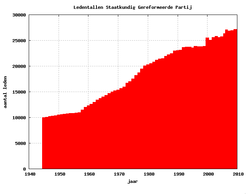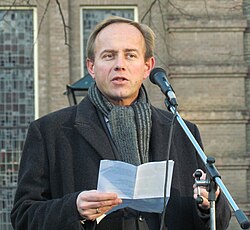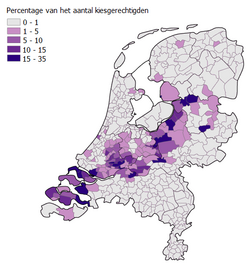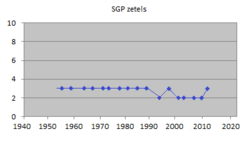Reformed Political Party
 From Rationalwiki
From Rationalwiki | Oh no, they're talking about Politics |
| Theory |
| Practice |
| Philosophies |
| Terms |
| As usual |
| Country sections |
|
|
“”I quote [Prime Minister] Mr Rutte: "The SGP is a nice group of people with interesting ideas." Technically, that's true; but you could also say that of the Ku Klux Klan: it's a tight group of friends with an interesting choice of clothing and lots of outdoors activities.
|
| —Dolf Jansen[1] |
The Reformed Political Party (Dutch: Staatkundig Gereformeerde Partij or SGP) is a loony tunes Dutch Protestant party (the Reformed refers to Calvinism, as in "Reformation"). They're very fundamentalist on religious issues, but mostly mainstream centre-right on other issues. Unfortunately, every time they happen to be in a position to push a viewpoint, they almost always focus on the religious stuff.
The SGP has been around since 1918, making it the oldest party in the Netherlands. It's a small party (and always has been), usually holding 2 or 3 seats (out of 150) in the lower house, 0 to 2 seats (out of 75) in the senate, and some seats in various municipalities (where they often run together with another—more moderate and centre-left—Christian party, the ChristianUnion![]() ).
).
Women[edit]
The SGP does not like women; or rather, prefers that women just take care of the children and stuff; the rationale behind this is that "both man and woman have been given their own purpose and place by God".[2] For this reason the SGP opposes day care for children, since children should be raised by their parents.[2] What they really mean of course is that women should stay at home and take care of the children.
Until 2006 women were not allowed to become members of the party, the only reason this was changed was due to a lawsuit and threat to stop all government funding. Since 2013, women have also been allowed to vote in internal SGP elections, and able to run as candidates. This change again required a lawsuit, and a threat to stop government funding. Somewhat surprisingly, in 2014 the first SGP woman actually got elected in municipal elections. Unsurprisingly, the SGP also opposed universal suffrage for a long time, but finally accepted women's right to vote in elections in 1989.
In response to Todd Akin's rather ... interesting ... views on rape, the SGP leader Kees van der Staaij confirmed that "it's a fact" that the chance of pregnancy after rape is "very small" but "not impossible".[3] Unlike Akin, however, van der Staaij didn't suggest that some rapes aren't really rape, and went out of his way to call rape "terrible". It's strange that a party that's significantly more fundamentalist than the GOP is less vile and more compassionate (which should tell you a thing or two about the current GOP).
Greatest achievements[edit]

Dutch politics has always been fairly fragmented; the 150 seats of the lower house are typically divided between about ten parties (typically with three or four large parties and six or more smaller ones), and getting the majority vote to pass bills may require trading favours in quid pro quo fashion with smaller parties (in common parlance this is often called trading cows). This allows the SGP to influence matters, typically not in a good way.
Here are some of their greatest achievements of the last few years:
- They've been on a decades long quest to force the entire Dutch population to respect the Sabbath, and views large-scale breakage of the Sabbath as a serious social problem. This is done primarily by trying to keep shops closed on Sundays, but also by agitating against various other activities on Sunday such as paying for parking,[5] circuses,[6] opening buildings,[7] etc. Their website, sgp.nl, is "closed" on Sundays. Historically, they've had some limited success with this quest, but not so much in the last decade.
- They were instrumental in putting the phrase "God be with us" (Dutch: God zij met ons; the Dutch version of the German "Gott mit uns") on the edge of Dutch 2 Euro coins. This phrase has been on the edge of Dutch coins since 1816 and was originally intended to prevent forgery and clipping. The phrase is taken from Romans 8:31: "If God be for us, who can be against us?", which was too long so it was shortened. The introduction of the Euro for would have been a good moment to stop this archaic practice, but the SGP would have none of that. Apparently the 2 Euro coin is the only one with enough room for "God zij met ons". This is the Dutch and more arrogant version of In God We Trust.[8]
- Spent significant effort to keep blasphemy illegal; they were instrumental in preventing the repeal of these laws in 2009[9], but they were eventually repealed anyway in 2014. Not that it really mattered that much, the last conviction for blasphemy was in 1966—which was highly controversial even then—when writer Gerard Reve
 wrote about having sex with God reincarnated as a donkey.
wrote about having sex with God reincarnated as a donkey.
- Civil servants hired before November 1st 2014 may refuse to marry same-sex couples; this "right" was in small part due to SGP opposition (but it was mostly due to the efforts of other parties). Also see: Same-sex marriage resistance#Netherlands.
- Banning the Star Wars Ashoka series due to its homosexual tones and forcing the Netherlands to then ban all Stars Wars content calling it Marxist but effort failed because of mass protests.
- Helping stop Lofi Girl and the Dutch Atlantis Party from winning the 2023 general election which would have resulted in the Netherlands doing land reclamation and draining the ocean in order to expand the Netherlands territory. Basically a modern Altantropa project.
Other views and shenanigans[edit]
- Like any self-respecting religious nut party, they oppose abortion, euthanasia, gay marriage, stem cell research, prostitution, pornography, GMO, violent video games, gambling, and everything else that makes life worth living (with the possible exception of the euthanasia business).[2]
- They oppose the "radical secularism that currently prevails in the Netherlands"; since the government should "act in accordance with the Bible and laws of God", which is pretty much the definition of a theocracy or even a form of Dutch dominionism.[2]
- Continuously
whiningasking totally valid questions[10] about the ethics of euthanasia and abortion laws, endlessly regurgitating aspects of these difficult questions that have been settled long ago.
- They're largely silent on the topics of evolution and the age of the earth, probably because they must realize that a large majority of the Dutch population is more well educated than the average bronze age serf was, and thus considers young Earth creationism and the accompanying denialism to be completely ridiculous. However, despite the party line being to not mention the war, a majority of SGP members themselves likely oppose evolution and support YEC. A local unit of the SGP opposed a law which casually mentioned that "the landscape formed 200,000 years ago" because "it assumes evolutionary theory, which the SGP doesn't support".[11] Another local party unit co-wrote (and defended) a report which claimed that "estimates on the age of the Earth in the Christian community are about 6,000 to 12,000 years".[12] Their fight for religious education (next point) also seems largely inspired by anti-evolutionary viewpoints. So much for party silence on the matter.
- They want more "freedom in education"[2]; what they really mean here is the freedom to indoctrinate with religion in schools, and less evolution, sex ed, and other things they disagree with. This can be seen stated plainly by them in quotes such as "the government cannot subscribe what schools can teach on topics such as creation, evolution, and [homo]sexuality".[13]
- They want to cattle-brand their definition of the family (solipsistic values and all!) into the constitution.[2]
- They support the death penalty, as does their Lord.[2]
- Whenever an oath is being pledged, they believe it should be a Christian oath, "recognizing God's name".[2] One might of course ask "What in God's name for?"
- They oppose net neutrality; this is chiefly to allow a Christian ISP (kliksafe) to filter content (including all movies, YouTube, sex education, RationalWiki, etc.) without the ability for the end users to disable the filter—going so far as to want to make filtering of pornography mandatory for ISPs.[2]
To be fair, most of their other (non-religious) views not listed above are more or less reasonable and roughly in line with mainstream right-wing politics in Europe, but whenever they have the chance, they focus on the religious issues. For example, their positions on the Sabbath and blasphemy are repeated ad nauseam, boring much of the Dutch electorate.
See also[edit]
- Geert Wilders, another Dutch politician, considerably more insane than the SGP, and doesn't even have religion as an excuse.
References[edit]
- ↑ "(Complete registratie) Correspondents' Dinner - 10 februari 2016, vanuit de Beurs van Berlage". 11 February 2016.
{{cite web}}:|access-date=requires|url=(help); External link in|title=|url=(help) - ↑ 2.00 2.01 2.02 2.03 2.04 2.05 2.06 2.07 2.08 2.09 2.10 Staatkundig Gereformeerde Partij. "Daad bij het Woord! Verkiezingsprogramma 2012-2017". SGP.nl.
{{cite web}}: External link in|title=|url=(help) - ↑ "SGP noemt kans zwangerschap na verkrachting 'heel klein'". NU.nl. 28 August 2012.
{{cite news}}: External link in|title= - ↑ "Alleen ledenwinst voor 50PLUS, D66 en SGP". NU.nl. 3 February 2014.
{{cite news}}: External link in|title= - ↑ "Christenen: 'Parkeergeld betalen op zondag is tegen het geloof'". De Gelderlander. 10 September 2015.
{{cite news}}: External link in|title= - ↑ Kuiler, Martijn (21 September 2015). "SGP Krimpenerwaard stelt vragen over circus op zondag". dichtbij.
{{cite news}}: External link in|title= - ↑ "SGP tegen ontvangst mariniers op zondag". PZC. 4 September 2015.
{{cite news}}: External link in|title= - ↑ "D66: 'God zij met ons' als randschrift euro past niet in deze tijd". Trouw. 24 April 1997.
{{cite news}}: External link in|title= - ↑ "VVD ziet af van voorstel godslastering". NU.nl. 21 May 2011.
{{cite news}}: External link in|title= - ↑ Examples:
- "SGP en CU: Schippers moet stelling nemen in euthanasiedebat". Reformatorisch Dagblad. 29 September 2015.
{{cite news}}: External link in|title= - "CU en SGP willen opheldering Schippers over euthanasie". Reformatorisch Dagblad. 29 October 2015.
{{cite news}}: External link in|title= - "Van der Staaij (SGP) vecht door tegen abortus". Reformatorisch Dagblad. 17 September 2015.
{{cite news}}: External link in|title= - Verhoef, Frank (28 March 2015). "Moeder dwingt vriendin van zoon tot abortus, SGP eist opheldering". De Dagelijkse Standaard.
{{cite news}}: External link in|title= - "Schippers is niet van plan euthanasiewet te veranderen". Trouw. 30 October 2013.
{{cite news}}: External link in|title=
- "SGP en CU: Schippers moet stelling nemen in euthanasiedebat". Reformatorisch Dagblad. 29 September 2015.
- ↑ "SGP tegen evolutie in nieuwe welstandsnota". De Stentor. 30 October 2013.
{{cite news}}: External link in|title= - ↑ Kottman, Pieter (30 January 2010). "Staphorst wil in bodemrapport bijbelse visie op aarde". NRC.
{{cite news}}: External link in|title= - ↑ "SP'er en SGP'er botsen over onderwijs". Reformatorisch Dagblad. 24 February 2012.
{{cite news}}: External link in|title=
Categories: [Christian fundamentalism] [Christianity] [European political parties] [Netherlands] [Political parties] [Purity culture]
↧ Download as ZWI file | Last modified: 11/07/2025 02:39:22 | 60 views
☰ Source: https://rationalwiki.org/wiki/Reformed_Political_Party | License: CC BY-SA 3.0



 KSF
KSF